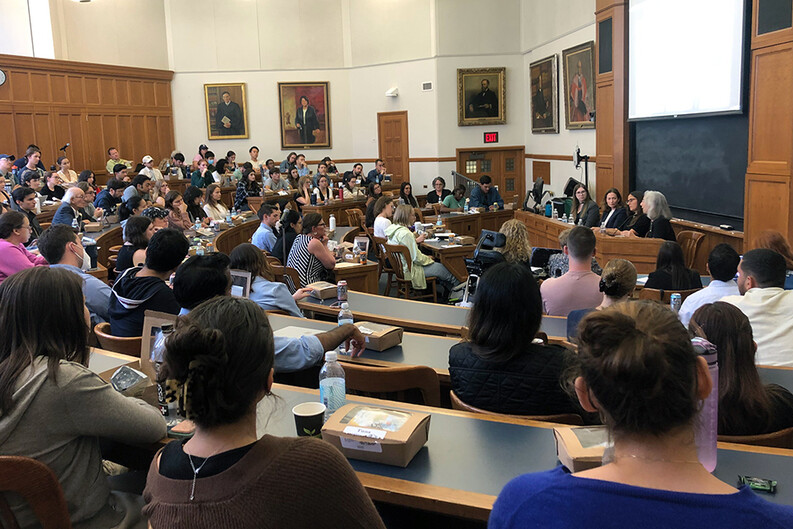Panel Reflects on a Year After the Fall of Roe

The Solomon Center for Health Law and Policy hosted a robust discussion on Sept. 20 titled “A Year after the Fall of Roe: Views from the Frontlines of Federal Policy, Medical Practice, and Law.”
The discussion was moderated by Beatrice Brown ’25 and featured Dr. Lisa Harris, F. Wallace and Janet Jeffries Collegiate Professor of Reproductive Health at the University of Michigan; Diana Kasdan, Director of Judicial Strategy for the U.S. Program with the Center for Reproductive Rights; Jennifer Klein, Assistant to the President and Director of the White House Gender Policy Council; and Reva Siegel ’86, Nicholas deB. Katzenbach Professor of Law at Yale Law School.
Harris started the discussion by providing firsthand knowledge about the impact of the Dobbs decision from the perspective of a health care provider. In her role as a clinician, Harris routinely sees patients with medically complex issues, many of whom face high-risk pregnancies. She discussed the challenges of counseling women on the potential need to seek abortion but noted that some of these challenges have been alleviated given Michigan’s recent legislation that repealed a total ban on abortion. She also discussed observations about patients who now travel to Michigan for reproductive care and abortion, since their home states have passed some form of abortion ban.
Kasdan outlined some of the signals that Dobbs would lead to an overturn of Roe v. Wade. She offered a three-pronged approach to combat the Dobbs decision: (1) work state-by-state and law-by-law, (2) offer direct legal support to states, individuals, and organizations, and (3) work with clients and providers to change the legal landscape.
Klein also offered a post-Dobbs strategy. She called on Congress to restore protections of Roe v. Wade in federal law, and to oppose a federal abortion ban. She discussed her work leading the White House Gender Policy Council and emphasized the need to look at gender equity policy domestically and globally. She also discussed the impact of Dobbs on how health care providers are providing abortion and reproductive care more broadly; she offered a few examples of how providers are seeking assistance in clarifying what they can and cannot do in this area.
Siegel stressed that the Dobbs decision, while consequential, did not completely destroy or end abortion rights. Many states are adopting various levels of legislative and policy protection to ensure their residents maintain access to much needed reproductive healthcare. She also noted that abortion bans can be gendered. For example, several states that have since implemented their own version of an abortion ban also have lower rates of access to health care, particularly reproductive and family planning care, as well as higher rates of maternal and infant mortality, particularly among women of color. She said that studies show that barriers to health care have lasting impact on a woman’s ability to gain economic, social and professional success, thereby further causing a cycle of inequity for women.


